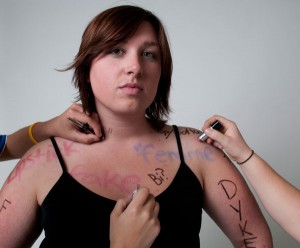Junior Catherine Kirchhoff puts on mascara in the morning, wears floral prints at the first sign of spring and highlights her hair every few months. But the difference between her and some girls who have a similar routine is Kirchhoff likes girls.

“I don’t look like a stereotypical lesbian,” she said. “Even now people question if I’m gay.”
Kirchhoff isn’t alone. Ithaca College has many gay students who don’t fit into the stereotypical mold. Lis Maurer, director for the Lesbian, Gay, Bisexual and Transgender Education, Outreach and Service Program, said though the community is very open-minded, some students just don’t feel “gay enough” to fit in.
“I hear it all the time,” Maurer said. “When a student says, ‘I’m a trans person, but I feel that I am not “trans” enough.’ That’s very, very common.”
When Kirchhoff came to the college, she said, she wasn’t fully aware she was gay, yet. After dating a woman in her dorm freshman year, things started to make sense, she said.
“There were hints here and there,” she said. “But signals went off when I lived in Rowland. Before I knew it, I was doing stuff that was going against my straight upbringing.”
Once she came out to her friends and family, Kirchhoff said, she noticed living as a lesbian wasn’t as liberating as she initially thought. She said other members of the LGBT community accused her of “looking too straight” or trying to attract straight girls.
To be “taken seriously,” Kirchhoff said, she ran for president of prism, an educational organization devoted to increasing awareness of gender issues.
“At first, I was really pissed off,” she said. “And I think that’s why I started doing prism: to get my name out there.”
Ann Kolodji, assistant professor of health promotion and physical education, said for years LGBT individuals often relied on cultural signifiers — like clothing, hairstyles and hobbies — to socialize themselves.
“As LGBT experiences became more visual, some of these cues have become less necessary for younger generations,” she said.
Junior Andrew Whitson is a member of the men’s club volleyball team at the college. Whitson spent the past eight years playing sports and openly telling his teammates that he is gay.
“Athlete is one aspect of who I am,” he said. “Gay is one aspect of who I am. Being a musician is one. Every single one is an aspect of who I am — not all of who I am.”
Whitson said he is comfortable with his standing in the gay community, but that he understands the challenge of being more reserved.
“I’ve heard stories of newer LGBT members who have just recently come out and been so reserved with their lifestyle that when they meet someone who just wears it on their sleeve, they go back and regress back to where they were before they were out,” Whitson said.
Whitson said it takes time, especially for people who have just come out, to get comfortable with their own sexuality. Though some are more comfortable than others, having gay pride can come in many forms, he said.
“There are definitely those individuals who are very flamboyant,” he said. “And that is a part of our culture. But that’s not all of who we are.”
Maurer said the only solution to bridging this gap is through communication.
“The one thing we can do is to have continued conversation about this,” Maurer said. “In my work I encourage that kind and thoughtful communication all the time.”
Junior Cameron Scheible said he is comfortable with his sexuality. But sometimes his flamboyant tendencies cause people to look at him differently, he said.
“People have made assumptions about me,” Scheible said. “They have been like, ‘Oh, you’re gay, so you must be into fashion design.’ And that makes me uncomfortable.”
Scheible said he views these stereotypes as overused generalizations that group people within an already small community. Though he knows he has some “girly” qualities, Scheible said he doesn’t feel any desire to be flamboyant.
“If Lady Gaga comes on, of course I start singing it and trying the dance,” he said. “I feel like that’s very stereotypical. You don’t really see straight guys going, ‘Oh, you want to go dancing?’”
Junior Kaitlin Dolan, who is on the college’s varsity softball team, often deals with lesbian stereotypes, she said.
“There’s a lot of different stereotypes for girls,” Dolan said. “There’s me, the butchy softball player. I personally don’t consider myself ‘butchy’ at all.”
Dolan said her physical appearance, with her short haircut and baggy clothing, is what gets her the “butchy” label, but she said she’s really a girly-girl at heart.
However, Kirchhoff’s girly tendencies get her recognized as a “lipstick lesbian”
or being “femme” (a feminine lesbian), while others call her a “fag-hag” (a straight girl who hangs out with gay people).
Kirchhoff said ironically most of these judgments come from the gay community.
“People say stuff all the time,” she said. “For a community that’s excluded from almost everyone, I am more so excluded in that community. My best friend, who is gay, said, ‘Well, at least you can fit into the larger community.’ And for some reason that stung.”
But Kirchhoff isn’t trying to fit into any stereotype. She is trying to be respected.
“I’m proud of who I am,” she said. “I break the mold, and that’s pretty cool.”




